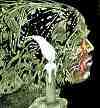
Science
The most powerful, successful, unified and rational of the varieties of human wisdom is that of the natural sciences. At present, this science does not extend far into human life. But, in medicine, and now in genetics, it has a toehold. The evolutionary teachings of science collide with religious doctrines of creation. It is a science that expands slowly. It has been barely 150 years since its chemists were able to show that the chemistry of organic life was not different than any other chemistry. It has been less than 50 years since the chemistry of genetics, the structure of DNA, has been isolated. Science has begun slowly to take a grip on the nature of life, and by extension the nature of human life. That grip is set to gradually tighten.
Science is deeply feared, precisely because religious thinkers and secular philosophers have long recognized a potentially powerful rival in it. It is feared in part because it has a close association with the military, as a regular producer of new and terrible weapons. But it is also feared because it is perceived to be heartless and amoral. And it is feared lest its determinism and mechanistic thinking will, in human life, make for rigid totalitarianism and the end of human freedom. And it is also feared because its arcane mathematical languages are as incomprehensible to ordinary people as Latin or Greek once were in medieval secular society. And indeed science, historically, has been indeed been lifeless, because life was (and largely continues to be) puzzling and inexplicable to scientists. Science has a long history of dissecting living creatures into their component parts, and in so doing deprived them of life, and of being in some profound sense dead. And scientists regularly assert that they study what is the case, and that it is for others to decide what ought to be the case.
But while science presently is heartless, and is amoral, this merely reflects the present extent of scientific understanding. A science that principally studies inert, dead matter, and for whom life is a mystery, cannot be other than heartless and dead. But the more that science extends and deepens its understanding of life, the more that it will itself become alive and heartful.
The present denial that descriptive science can say anything about prescriptive morality goes back to David Hume. But Hume merely asked how an 'ought' could ever be derived from 'is'. But if human beings possess value systems and moral codes much as they possess arms and legs, then these values and codes are as much a part of the natural world as anything else, and there is no reason to separate them out as in some sense beyond the province of a science which "takes all nature as its province". There is no reason, in principle, why science cannot study values and ethical codes - and in so doing cease to be amoral.
Idle Theory explores one route by which science might engage not only with life, but with the deep economic and political and ethical problems of human life. Idle Theory is not science, but science fiction. It asks: what if life is like this? And offers its Idle Life model, which is an energy model of life rather than a genetic model. This lazy, do-nothing kind of life echoes on one hand the Least Action principles which abound in physics, and on the other an all-too-recognizable human indolence. Its variant theory of evolution proposes that it was regularly the most indolent, do-least varieties of life which outlived busier and more industrious cohorts. The path of evolution is one of life doing ever less. Human life is no exception. Human society, technology, ethics, laws, are all about minimizing human work. In human society, through a division of labour, humans could live an easier life than outside it. Human tools, from flint axes to computers, reduced human work. Ethical codes and laws minimized contention and conflict, and were vital to the smooth and easy operation of society. Human religions, with their utopian dreams of Eden, Heaven or Nirvana, and their dystopian dread of a Hell of work and pain and suffering, articulated not only the deepest dreams of humanity, but of life itself. In Idle theory, ethics is not about what free men should or should not do, but about how men should act in order to become free. In Idle Theory, economics is not about the production and exchange of pleasurable toys, but the production and exchange of labour-saving tools.

